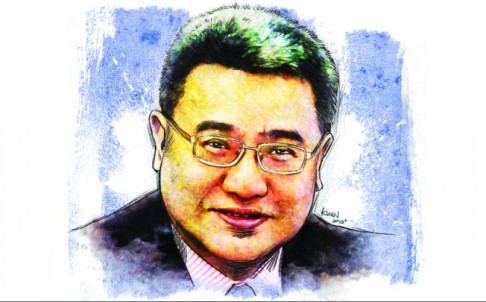Huang Chi-yuan, cross-strait private equity guru
Huang Chi-yuan explains the success of his approach to pulling off private equity deals involving the two sides of the Taiwan strait
Illustration: Lau Ka-kuen
Huang Chi-yuan is a practised multitasker. He has to be, in his position as chairman of the Taipei-based boutique merchant bank First China Capital Partners and also of the Taiwan Mergers and Acquisitions and Private Equity Council.
 "You're just like an inspector," said Huang, 52. "You can't be too shy about doing due diligence. That's how investors in the United States got burned."
"You're just like an inspector," said Huang, 52. "You can't be too shy about doing due diligence. That's how investors in the United States got burned."
Educated at Stanford University in California, Huang has worked in investment banking for 25 years, including a stint in the 1980s for JP Morgan in New York. Today he has a particularly attractive view from his office in Taiwan, a growing economy that is steadily opening to mainland China, where the growth is even higher.
Huang, Taiwanese himself, says he excels in deals for China-based firms with Taiwanese leaders because their management was watertight. "It is my broad experiences in China, Hong Kong, and Taiwan that give me a unique sense and capability of putting cross-strait deals together," he says.
He can talk for an hour about the deals he has been involved in. Two years ago, for example, he brokered a US$300 million sale of the mainland-based, Taiwanese-owned Golden Jaguar buffet restaurant chain to the British private equity fund Apax Partners. After advising the mainland tea distributor Tenfu for a decade, Huang's company showed it the way to a US$182 million listing in Hong Kong and to the American private equity investor General Atlantic, which committed to buying 40 per cent of the IPO. In 2012, Huang led the Taiwanese-owned cosmetics packaging manufacturer Hsin Chung Plastics to a US$500 million buyout by another American private equity firm, TPG Capital.
Huang's company closed the cross-strait deals after disappointing experiences with clients that he discovered were already dealing with other parties. Those clients would take his ideas back to the original investor to try to get more out of an earlier deal.
"It's like being used, or being leveraged," said Huang, who works 12 to 13 hours a day, and once toyed with the idea of directing films instead of investing. "People shop around. People use me to do more work to bid up their price. Maybe I introduce several investors, but they have probably already cut a deal. The company will say, 'No, no, no, you are exclusive.' But this is minor, compared to fabricating your accounts," he smiled.
Taiwan's dealmakers are in a unique position to work with Chinese companies as cross-strait relations improve. While the sovereignty dispute between Taiwan and Beijing created icy relations that once ruled out most economic ties, since 2008, Taiwan president Ma Ying-jeou's government has opened trade and investment talks with the mainland.
Now, more than 400 sectors in Taiwan are open to mainland investment, and investors from the other side can park increasing amounts in the stocks of Taipei-listed firms. In one large example, the mainland LED maker San'an Optoelectronics said in November that it would invest US$80 million in the Taiwanese LED chipmaker Formosa Epitaxy and take a 20 per cent share.
The Taiwan Mergers and Acquisitions and Private Equity Council is pushing the Taiwan government to open up further. Huang has complained in the past that Taiwan's approval process for each mainland-linked deal is confusing and subject to fears of a public backlash.
"Francis Leung of Peregrine pioneered 'red-chip stocks' in the 1990s and reshaped the Hong Kong capital market," Huang said. "It is possible that cross-strait co-operation will lead to a new wave of 'Tai-chip' companies in the future."
Without the Taiwan edge, private equity deals are tough on the mainland, Huang has found. Offshore investors once ruled, but today an estimated 10,000 Chinese yuan funds understand the local mindset and act in a more ruthless way to make deals, Huang said: "They don't need foreign money for itself."
Offshore asset managers fare best if they offer strategic gains, such as technology that the mainland side lacks, or if they help line up investors for any of about 880 mainland firms in the queue for IPOs, Huang said. Offshore investors are also considered less prone to scams.
Huang believes that despite all the activity across the strait, the private equity future lies not in China, but Southeast Asia. Malaysia deserves a look because the government is privatising 21 companies, he says, while Indonesia comes with an unusually large consumer market plus natural resources.
"People are sick and tired of China," Huang says. Southeast Asia, he says, is "virgin territory. Very few deals have been done. There's less competition. In China, for each deal you face five competitors".
This article first appeared in the South China Morning Post print edition on Mar 25, 2013 as A doer across the strait
資料來源:http://www.scmp.com/business/china-business/article/1198965/huang-chi-yuan-cross-strait-private-equity-guru
資料來源:http://www.scmp.com/business/china-business/article/1198965/huang-chi-yuan-cross-strait-private-equity-guru


沒有留言:
張貼留言